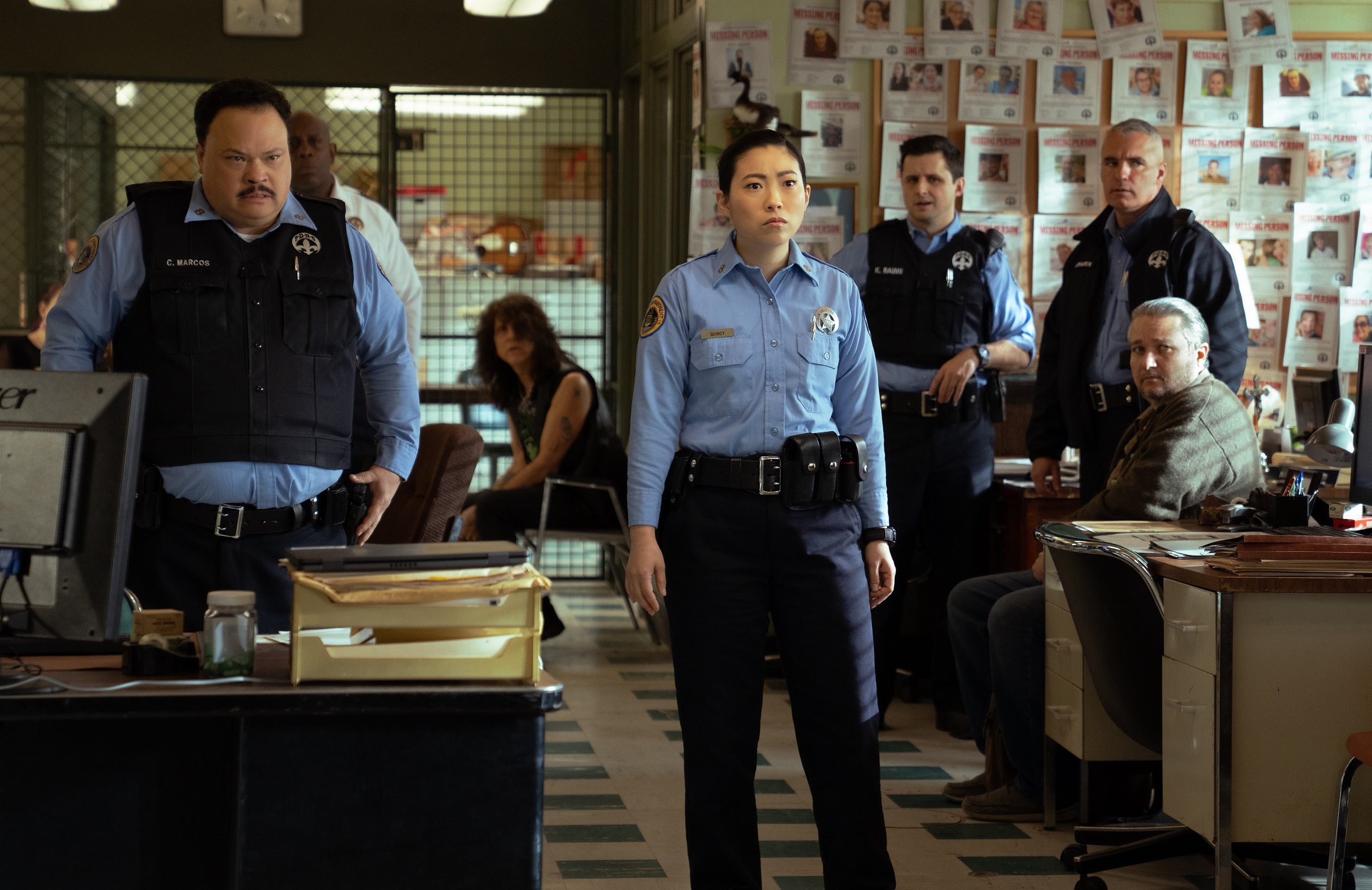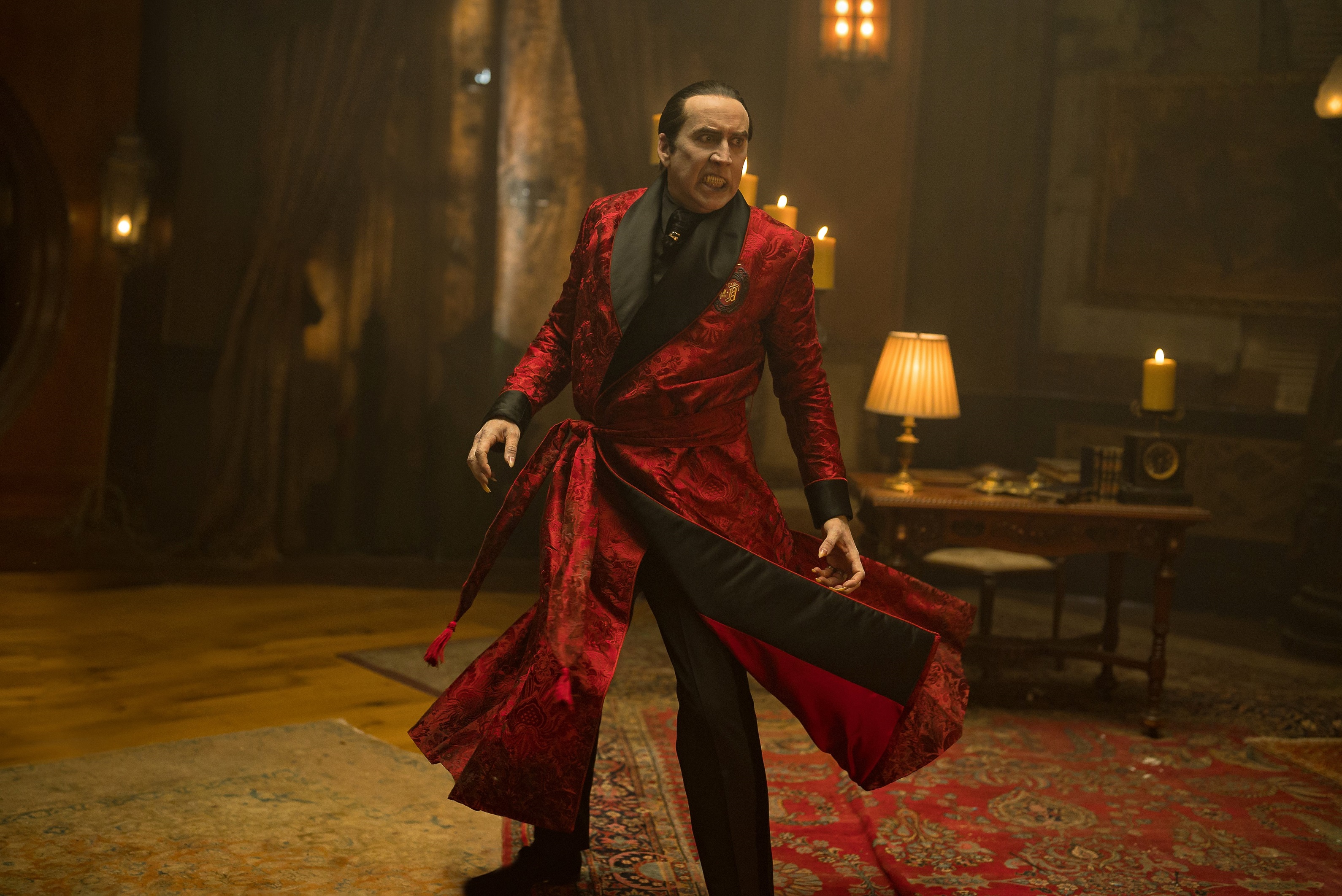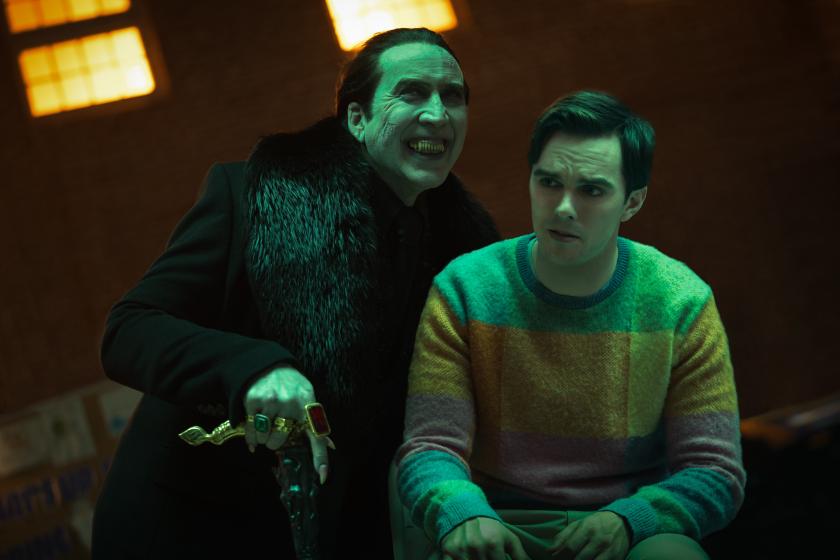Dracula’s fly-eating henchman Renfield (Nicholas Hoult) seeks solace in a self-help group from his co-dependent, fanged boss (Nicolas Cage), in a comic horror action flick which posits the pair as a vampiric Steptoe and Son – though that relationship was more genuinely nightmarish.
The Dark Universe Universal hoped to create around its classic 1930s monsters crashed with the redundant medieval origin story Dracula Untold (2014) and braindead Tom Cruise vehicle The Mummy (2017), but standalone hit The Invisible Man (2020) – ditching H.G. Wells for an Elisabeth Moss domestic abuse thriller – convinced the studio to keep disinterring its mouldering ghouls. The Walking Dead’s Robert Kirkman then cooked up Renfield’s concept, and The Lego Batman Movie’s Chris McKay breezily directs.
Its link to vintage Universal horror is a prologue in which Cage replaces Bela Lugosi in 1931’s Dracula, and Hoult splices posh, doomed Jonathan Harker with Dwight Frye’s original, grotesque bug-eater. Renfield thus becomes a tonally bizarre, belated sequel to the romantic Drac myth’s foundational film, following rat-like Max Schreck in 1922’s Nosferatu.
 Light on funds and half-fried after an undead eternity of being vampire-hunted, Dracula is now recuperating in a New Orleans hospital basement. Renfield is tasked with filling his larder, selecting his self-help group’s enemies to sate his growing moral qualms. Dracula rejects this lowlife fare, demanding the piquant innocence of nuns or “a busload of cheerleaders”. Renfield meanwhile runs foul of gangster Tommy Lobo (Ben Schwartz), inadequate son of clan matriarch Bellafrancesca (Shohreh Aghdashloo), and falls for cop Rebecca (Awkwafina, pictured above centre), impotently furious at the Lobos’ immunity from arrest by her paid-off colleagues. Comic mayhem crossing Jackie Chan with Peter Jackson’s early splatter period ensues, with torn-off arms as clubs and spears.
Light on funds and half-fried after an undead eternity of being vampire-hunted, Dracula is now recuperating in a New Orleans hospital basement. Renfield is tasked with filling his larder, selecting his self-help group’s enemies to sate his growing moral qualms. Dracula rejects this lowlife fare, demanding the piquant innocence of nuns or “a busload of cheerleaders”. Renfield meanwhile runs foul of gangster Tommy Lobo (Ben Schwartz), inadequate son of clan matriarch Bellafrancesca (Shohreh Aghdashloo), and falls for cop Rebecca (Awkwafina, pictured above centre), impotently furious at the Lobos’ immunity from arrest by her paid-off colleagues. Comic mayhem crossing Jackie Chan with Peter Jackson’s early splatter period ensues, with torn-off arms as clubs and spears.
Renfield’s milieu bears zero relation to reality, and the sense of crude artificiality feels Eighties or a little after – not John Landis’s heart-breaking horror comedy An American Werewolf in London (1981), so much as his limp Mob-vampire flop Innocent Blood (1992).
 Hoult makes Renfield a primly English, sad enabler of Dracula’s depredations, and a romantic and bug-powered action lead, well-matched with the always engaging Awkwafina. Cage’s first studio movie since the excess and subsequent insolvency of his megastar days sent him into prolific, indie uber-Cage overdrive is, though, Renfield’s main selling-point. Cage drew on his domineering dad, who showed him Nosferatu aged 5, motives he needed to go to work. Hair slicked back and fang-filled mouth like a shark, he anarchically spins through modes, as if gambling on the jackpot, aristocratically suave then aping Mike Myers’ chin-stroking Dr Evil, ferociously dangerous then camply sarcastic. The world is “followers and food”, he concludes with a greedy slurp. Fragments of a performance in Christopher Lee’s lineage flicker into focus, ready to be rooted by a sturdier film. But perhaps this is as good a place as any to see this born bohemian’s vampire sketches.
Hoult makes Renfield a primly English, sad enabler of Dracula’s depredations, and a romantic and bug-powered action lead, well-matched with the always engaging Awkwafina. Cage’s first studio movie since the excess and subsequent insolvency of his megastar days sent him into prolific, indie uber-Cage overdrive is, though, Renfield’s main selling-point. Cage drew on his domineering dad, who showed him Nosferatu aged 5, motives he needed to go to work. Hair slicked back and fang-filled mouth like a shark, he anarchically spins through modes, as if gambling on the jackpot, aristocratically suave then aping Mike Myers’ chin-stroking Dr Evil, ferociously dangerous then camply sarcastic. The world is “followers and food”, he concludes with a greedy slurp. Fragments of a performance in Christopher Lee’s lineage flicker into focus, ready to be rooted by a sturdier film. But perhaps this is as good a place as any to see this born bohemian’s vampire sketches.
Almost another Universal horror disaster, the film is saved by its carefree eccentricity in an identikit mainstream, and sound central concept. The sparse Saturday night crowd I saw it with happily tuned into its broad cartoon style. The glib insubstantiality, though, left me hungry afterwards.















Add comment